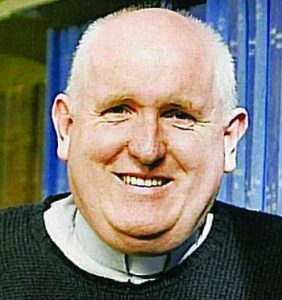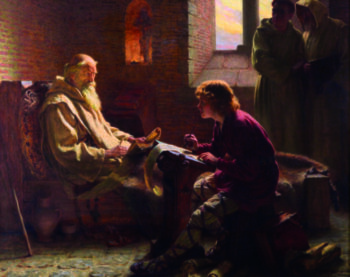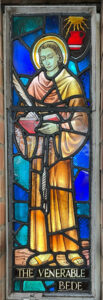St Bede the Venerable – 25 May

By Fr Mervyn Duffy SM
On 26 May in the year 735 AD, Fr Bede died at Jarrow in England. His death was described in a letter by one his students, Cuthbert. According to him Bede spent his last day working on a translation, dictating to a scribe – a young boy called Wilberht. The well-known painting is based on this letter.
Bede was famous in his own lifetime as an extraordinary scholar. He had written some sixty books. His writings on grammar, natural history and chronology became the standard school texts throughout medieval Europe.
It is as an historian that he is most remembered. His Ecclesiastical History of the English People is one of the very first attempts to tell the story of England. One of the top historians of last century, Sir Frank Stenton, wrote of Bede that through his "astonishing power of co-ordinating the fragments of information which came to him through tradition, the relation of friends, or documentary evidence ... In an age where little was attempted beyond the registration of fact, he had reached the conception of history."

The last chapter, by J. Doyle Penrose (1902) -
(Bede translating the Gospel of John)
In his preface, Bede explains why he wrote history:
“Should history tell of good men and their good estate, the thoughtful listener is spurred on to imitate the good; should it record the evil ends of wicked men, no less effectually the devout and earnest listener or reader is kindled to eschew what is harmful and perverse, and himself with greater care pursue those things which he has learned to be good and pleasing in the sight of God.”
He was writing with a moral purpose – he wanted his readers to imitate the good guys of history and to avoid the mistakes made by the villains.
He popularised a new dating system in that book, one that had been invented by Dionysius Exiguus (Denis the Short) two hundred years before. Instead of counting by indictions or by the reign of the king, he dated events from “the year of the Lord” – anno domini. Thanks to the influence of Bede the AD system of counting years caught on.
Most of what we know about Bede’s life is from a couple of paragraphs he appended to the Ecclesiastical History:
“I have spent all my life in this monastery, applying myself to the study of the scripture; and amid the observance of the discipline of the Rule and daily task of singing in the church, it has always been my delight to learn or to teach or to write … From the time I became a priest until the fifty-ninth year of my life I have made it my business, for my own benefit and that of my brothers, to make brief extracts from the works of the venerable fathers on the holy scriptures, or to add notes of my own to clarify their sense and interpretation.”

St Bede, All Saints Ponsonby Church
As well as scripture commentaries, history, science and chronology, Bede wrote poems and hymns and homilies. I’ll give you a couple of snippets from his homilies – some 50 of these have survived.
From one of his Homilies on the Gospels:
“For there are those who, when they enter the church, prolong their psalmody or prayer with many words but because the attention of their heart is directed elsewhere they do not reflect on what they are saying. They are indeed praying with their mouth, but they are depriving their mind of every fruit of prayer because it is wandering outside; they think that their prayer will be heard by God, although those who utter it are not listening to it themselves.” - Bede, Homilies on the Gospels 1.22
So, Bede wanted his fellow monks to pay attention when they were in Church, to listen to themselves when they were praying.
Listening may have been a regular theme for him. Here’s a bit from another homily about the finding of the child Jesus in the Temple.
“It is doubtless a sign of the Lord’s human humility that he comes to Jerusalem with his parents every year at Passover. Surely it is characteristic of human beings to come together to offer vows of spiritual sacrifices to God and to procure their Creator’s favour toward them with copious prayers and tears. Therefore the Lord, being born as a human being among human beings, did that which as God he had divinely ordered through angels that human beings should do. […] The fact that when he himself was twelve years old he sat in the temple in the midst of the teachers, listening and asking them questions, is a sign of his human humility, but it is also an excellent example of humility for us to learn. […] And the one who was going to undertake the office of teaching as a youth did well to listen to the elders and ask them questions while he was still a little boy, evidently so that through this prudent plan he might curb the audacity of those who, although they are not only uneducated but also immature, wish to rush forth into teaching rather than submitting to learning. Let us follow the path of his humanity …” Bede, Homilies on the Gospels 1.19
So, Bede, wanted his monks, especially the bright ones to listen to their teachers with some humility.
Bede lived a long time ago and a long way away. He spent his life praying and studying the scriptures and trying to live them out, he would want us to do the same. To listen to the gospel and then to act with charity. Or in other words – to have both Faith and Works – Fide et Opere
 Entries(RSS)
Entries(RSS)